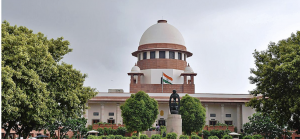New Delhi, Sep 17: Fairness is a “hallmark of great advocacy,” according to the Supreme Court, and the trial courts would struggle to handle the massive backlog of cases if the bar members refused to work with them. The statements were made by the supreme court when it heard a petition related to a Bombay High Court judgement. It stated that a significant number of lawsuits are pending in Maharashtra’s trial courts, according to statistics from the National Judicial statistics Grid. “If the Bar members do not cooperate with the trial courts, it will be very difficult for our courts to deal with the huge arrears,” a bench of Justices Abhay S. Oka and Rajesh Bindal declared in its ruling on September 14.z The highest court ruled that during a trial, bar members must serve as officers of the court and conduct themselves in a reasonable and fair manner. “The Bar members must keep in mind that excellent advocacy is characterised by impartiality. The trial cannot go normally if the attorneys start raising objections to every question presented during the cross-examination. The trial is postponed,” it stated.The highest court made these findings after noting that, according to the trial court’s record of the case, one of the solicitors had raised objections to each question asked of a witness during cross-examination. The high court’s order from June 2021 halting the implementation and operation of a district court’s judgement and decree in a lawsuit brought by a company selling country booze was appealed, and the bench handed down its ruling on the matter. The company had requested a permanent injunction prohibiting another business from violating the copyright in its artistic label, asserting that it owns the copyright of the artistic label that is shown on the bottles of the country spirits it sells.A order of injunction prohibiting the opposing party from producing, distributing, offering for sale, advertising, or otherwise dealing in country spirits with its trademark label or any confusingly similar trademark label was also requested by the firm in its lawsuit. The district court’s order prohibiting the manufacture, sale, offering for sale, advertising, and any business dealing with country booze carrying the plaintiff’s trademark label or any other trademark label that is confusingly similar to it was noticed by the supreme court.The high court granted a request from the opposing corporation, which caused the decree’s execution and operation to be suspended pending the outcome of the appeal. The Supreme Court noted it cannot avoid noting “certain disturbing features” about the conduct of a member of the Bar during the course of the case’s trial as it dismissed the plea and noted that the High Court was justified in granting the order of stay pending final disposition of the appeal. It made reference to the tape made by the trial court when one of the firms was cross-examining a witness. The trial judge had remarked that the attorney was taking objections to each and every question, the bench said.The top court stated that given the circumstances of the case and the advocate’s constant objections, a significant portion of the cross-examination had to be recorded in question and answer format, taking up a lot of the court’s time. The bench explicitly stated that the high court would not be affected by the apex court’s observations when making its decision on the now ongoing appeal when dismissing the petition. (Agencies)

